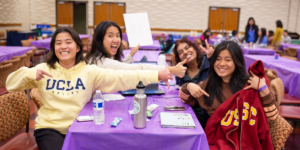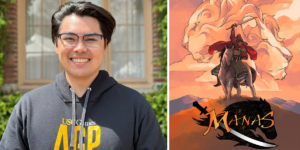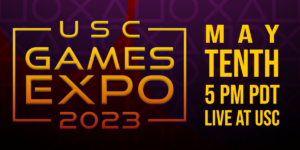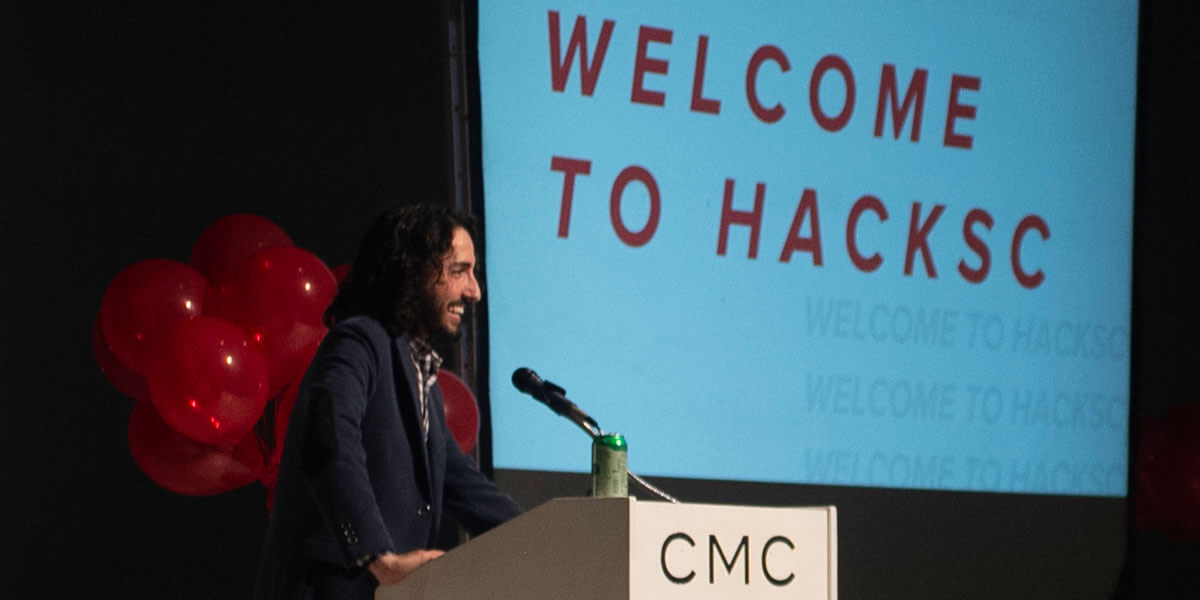
Emceed by USC alum Giovanni Moujaes, the opening ceremony outlined the 36 hours to come, as well as provide a platform for sponsors to explain their technologies and individual prizes. PHOTOS COURTESY of HackSC.
On April 12, 2019, HackSC’s capstone event had finally arrived.
At 9 am, the 13th floor penthouse at the California Market Center was barren and cold as Everest on a cloudy day. But by noon, the small yet passionate cohort of HackSC organizers had filled it with seating for 800 people, set up Internet and power for everyone to come, brought enough food and refreshments to nourish the inevitably hungry hackers for a full weekend, and decorated the rooms to breathe some Trojan life into them.
As busloads of hackers arrived from schools up-and-down the West Coast, many arriving students sat their belongings down and began initially brainstorming their upcoming projects. Others started early conversations with representatives and recruiters from HackSC’s numerous sponsors, and some took preliminary naps from travel exhaustion.
Emceed by USC alum Giovanni Moujaes, the opening ceremony outlined the 36 hours to come, as well as provide a platform for sponsors to explain their technologies and individual prizes.
The ceremony also hosted two distinguished guest speakers: Hemant Warudkar, CEO of Express Analytics, and USC Viterbi alum Eric Gradman, B.S. ’02, co-founder of the celebrated Two Bit Circus. Their speeches inspired the visiting hackers for the weekend to come and provided possible direction for a future in technology.
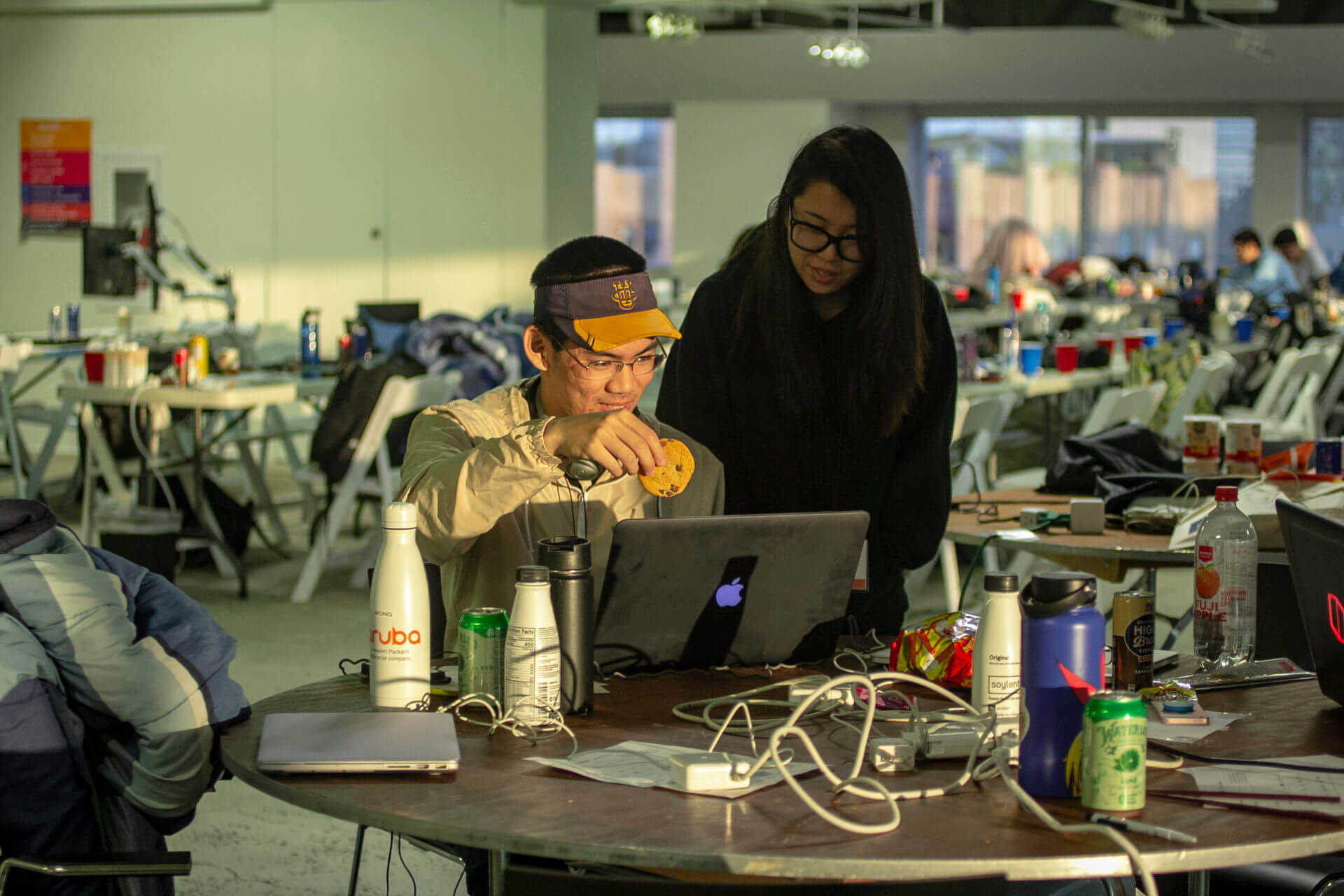
HackSC 2019 participants compete in the 36 hour hackathon.
After the ceremony concluded, it was time to get to work. There were team-building workshops to help those who may have arrived alone or in undersized groups, and additional blocks of time for hackers to talk with sponsors such as Facebook, Amazon Web Services, Google Cloud Services, and many more. Then, students could decide whether to build their products to particular qualifications for sponsor prizes, or they could apply to one of HackSC’s three verticals: entertainment, entrepreneurship, and travel. Each category was made to encourage hackers to solve a specific issue and give them direction, and also to offer catered prizes. The entertainment winners were eligible for an Oculus GO and EA game codes for each team member. Every member of a team that would win the entrepreneurship vertical would receive a $150 Amazon gift card, and the team would get to meet with and pitch to Okapi Ventures VC. Finally, the transportation vertical prizes were a Dragon Touch Camera and kit for each member of the team, tech travel backpacks, and tickets to Stockholm, Sweden to compete in a travel-centered hackathon.
As the hours trickled away, hackers were equipped with the knowledge shared at sponsor workshops, as well as countless activities to help take their mind off the competition. HackSC 2019 hosted a Soylent pong tournament, sunrise yoga led by CorePower Yoga, a puppy pit to cuddle the stress away, an improv comedy workshop, cup stacking challenge, and perhaps the most popular leisure activity, a Nerf dart dodgeball tournament. The aim? To demonstrate that hackathons aren’t just places to stare at a screen, but to collaborate and have fun with one another.

HackSC 2019 hosted a puppy pit to cuddle the stress away. In addition, one of the hackathon’s three winners was Virtual Dog, a VR game in which the player can interact with a virtual dog.
As Sunday, April 14, rolled in, teams added the finishing touches to their projects and pitched to judges.
Entrepreneurship was won by a team whose app was a crisp and convenient alternative to Postmates for college students. Postmates can deliver almost anything, but it can’t bring your calculator to your class if you forget it. The app, Dormdash, connects students with each other to provide services only peers could offer each other, bridging campus-locked life with issues of the outside world.
The team who won the entertainment vertical did so with Virtual Dog, a VR game in which the player can interact with, unsurprisingly, a virtual dog. In just a weekend, the team of three was able to build a digital dog which responds to several voice commands, and with time, the team hopes to extend the project to offer a realistic alternative to those who may be unable to care for a live animal to have the benefits of canine companionship.
Last, but certainly not least, came the transportation category winners. Their impressive driving assistant app, Dash, analyzes road conditions in real time, uploading data such as roadside accidents to the cloud and adjusting navigation accordingly. After just one weekend, the team of college-aged students managed to create a viable competitor to many major navigation apps on the market.
With everyone leaving tired and proud, the HackSC organizers stayed behind to clean up the venue they set up less than two days before. With music as motivation and a camaraderie only made possible by weeks of stress and a weekend of sleeplessness and shared experience, the organizers almost made it back in time for the season premiere of “Game of Thrones.”
HackSC started this year with nothing but an idea and hopes for USC to hold a hackathon, and just four months into 2019, HackSC has become a new standard for what it means to hold a fun, fulfilling, successful hackathon.
Published on April 30th, 2019
Last updated on April 30th, 2019




